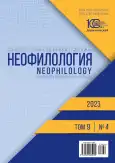Didactic potential of authentic advertising texts in Russian as a foreign language classes
- Authors: Terskikh M.V.1, Zaytseva O.A.1
-
Affiliations:
- Dostoevsky Omsk State University
- Issue: Vol 9, No 4 (2023)
- Pages: 767-778
- Section: RUSSIAN LANGUAGE. LANGUAGES OF PEOPLES OF RUSSIA
- URL: https://journal-vniispk.ru/2587-6953/article/view/295774
- DOI: https://doi.org/10.20310/2587-6953-2023-9-4-767-778
- ID: 295774
Cite item
Full Text
Abstract
The didactic potential of the texts of modern commercial advertising in Russian as a foreign language classes is studied. In the theoretical part of study, the authors turned to the foreign experience of considering authentic materials as a means of developing communicative competence in teaching foreign languages. Approaches to the concept of authentic materials, the principles of their selection and algorithms of application in pedagogical practice are systematized. The advertising text is considered both as a means of improving linguistic competence and as a tool for integrating cultural components into the learning process, the advantages and disadvantages of advertising texts in terms of their linguo-methodological function are identified, and criteria for selecting promotional materials for classes in Russian as a foreign language are formulated. As a practical material, an algorithm for working with advertising texts at different levels of Russian language proficiency is presented, sample tasks are proposed for use in Russian as a foreign language classes in accordance with the three classical stages of working with text: preparatory (pre-demonstration), cognitive (demonstration) and reinforcing (post-demonstration). In the work, such research methods as the descriptive-analytical method, the method of systematization and classification, the design method, as well as the communicative method of teaching a foreign language are used.
About the authors
M. V. Terskikh
Dostoevsky Omsk State University
Email: terskihm@mail.ru
ORCID iD: 0000-0003-0127-6917
PhD (Philology), Associate Professor, Associate Professor of Theoretical and Applied Linguistics Department
55-A Mira Ave., Omsk, 644077, Russian FederationO. A. Zaytseva
Dostoevsky Omsk State University
Author for correspondence.
Email: o.a.plotnikova@rambler.ru
ORCID iD: 0000-0003-2704-2158
PhD (Philology), Associate Professor of Theoretical and Applied Linguistics Department
55-A Mira Ave., Omsk, 644077, Russian FederationReferences
- Peacock M. The effect of authentic materials on the motivation // ELT Journal. 1997. Vol. 51. Issue 2.
- P. 144-156. https://doi.org/10.1093/elt/51.2.144
- Lee W. Authenticity revisited: text authenticity and learner authenticity // ELT Journal. 1995. Vol. 49.
- Issue 4. P. 323-328. https://doi.org/10.1093/elt/49.4.323
- Romero-Molina P. X., Alfonso-Vargas J. Authentic materials and task design: a teaching amalgam for listening // Colombian Applied Linguistics Journal. 2023. Vol. 25. № 1. P. 118-131. http://dx.doi.org/
- 14483/22487085.18581
- Gilmore A. “I prefer not text”: developing Japanese learners’ communicative competence with authentic mate-rials // Language Learning. 2011. Vol. 61. Issue 3. P. 786-819. https://doi.org/10.1111/j.1467-9922.2011.00634.x
- Castillo Losada C.A., Insuasty E.A., Jaime Osorio M.F. The impact of authentic materials and tasks on stu-dents’ communicative competence at a Colombian Language School // Profile Issues in Teachers’ Professional Development. 2017. № 19 (1). P. 89-104. http://dx.doi.org/10.15446/profile.v19n1.56763
- Ghaderpanahi L. Using authentic aural materials to develop listening comprehension in the EFL classroom // Canadian Center of Science and Education. 2012. № 5 (6). P. 146-153. https://doi.org/10.5539/elt.v5n6p146
- Kraiova O., Tsybaniuk T. Use of authentic video materials in teaching listening // Modern Information Technol-ogies in the Sphere of Security and Defence. 2015. № 3 (24). P. 141-144.
- Ghanbari N., Esmaili F., Rezam M. The effect of using authentic materials on Iranian EFL learners’ vocabulary learning // Theory and Practice in Language Studies. 2015. Vol. 5. № 12. P. 2459-2468. http://dx.doi.org/10.17507/tpls.0512.05
- Gómez L.F. Fostering intercultural communicative competence through reading authentic literary texts in an advanced Colombian EFL classroom: a constructivist perspective // Profile Issues in Teachers Professional De-velopment. 2012. № 14 (1). P. 49-66.
- Bernal-Pinzón A.N. Authentic materials and tasks as mediators to develop EFL students’ intercultural compe-tence // HOW Journal. 2020. Vol. 27. № 1. P. 29-46. https://doi.org/10.19183/how.27.1.515
- Liu J. Adaptation of authentic materials in English listening comprehension classes // Theory and Practice in Language Studies. 2016. Vol. 6. № 9. P. 1774-1779. http://dx.doi.org/10.17507/tpls.0609.08
- Зайцева О.А., Терских М.В. Использование аутентичных текстов на занятиях по русскому языку как ино-странному (на примере кулинарных рецептов) // Коммуникативные исследования. 2023. Т. 10.
- № 3. С. 607-624. https://doi.org/10.24147/2413-6182.2023.10(3).607-624
- Зайцева О.А., Терских М.В. Дидактический потенциал новостных видеосюжетов на занятиях по русскому языку как иностранному // Актуальные проблемы филологии и педагогической лингвистики. 2023. № 2. С. 216-228. https://doi.org/10.29025/2079-6021-2023-2-216-228, https://elibrary.ru/acvbjw
- Цурцилина Н.Н. К вопросу об обучении русскому языку как иностранному // Неофилология. 2018.
- Т. 4. № 16. С. 32-38. https://doi.org/10.20310/2587-6953-2018-4-16-32-38, https://elibrary.ru/yqhyrn
- Zyzik E.C., Polio C. Authentic Materials Myths: Applying Second Language Research to Classroom Teaching. Michigan: University of Michigan Press, 2017. 184 p. https://doi.org/10.3998/mpub.7892433
- Al-Azri R.H., Al-Rashdi M.H. The effect of using authentic materials in teaching // International Journal of Scientific & Technology Research. 2014. № 3 (10). P. 249-254.
- Torregrosa G., Sánchez-Reyes S. Use of authentic materials in the ESP classroom // Encuentro. 2011. № 20. P. 89-94.
- Borucinsky M., Jelčić-Čolakovac J. Promoting authenticity in the ESP classroom: the impact of ICT and use of authentic materials on reading comprehension // 5th International e-Conference on Studies in Humanities and Social Sciences: Conference Proceedings. Belgrade: Center for Open Access in Science, 2020. P. 31-44. https://doi.org/10.32591/coas.e-conf.05.03031b
- Денисултанова В.Д. Применение рекламных текстов на уроках русского языка как иностранного // Но-вый мир. Новый язык. Новое мышление: 5 Междунар. науч.-практ. конф. М.: Дипломатическая академия МИД РФ, 2023. С. 403-407. https://elibrary.ru/fxbsxs
Supplementary files









